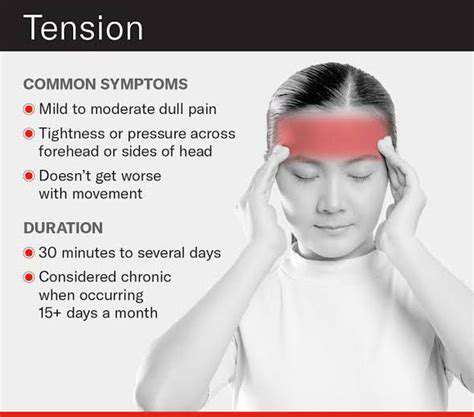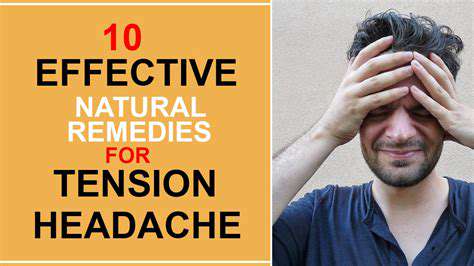Recognizing the Symptoms of Tension Headaches
Common Symptoms of Tension Headaches
Tension headaches are characterized by a dull, aching pain that can feel like a tight band around the head. This discomfort typically affects both sides of the head, leading to a consistent level of pain that can be distressing for individuals.
Aside from the primary headache sensation, many people experience additional symptoms such as tenderness in the scalp, neck, and shoulder muscles. These areas can become tense and sore, often compounding the overall discomfort.
Other symptoms might include fatigue and irritability. As the headache persists, individuals may find it difficult to concentrate on daily tasks or engage in social activities, which can further affect their mood.
Nausea and sensitivity to light or sound are generally less common with tension headaches compared to migraines, yet some individuals report feeling slightly affected in these ways, especially during prolonged bouts of discomfort.
Recognizing these symptoms is essential for timely relief and management. Keeping track of their frequency and duration can help individuals identify patterns that might inform their treatment strategies.
Possible Causes of Tension Headaches
Tension headaches can be triggered by a variety of factors, many of which are interrelated. Stress is one of the primary causes, as emotional and mental struggles often lead to muscle tension in the neck and scalp, setting the stage for a headache.
Furthermore, poor posture during work or leisure activities can contribute significantly. Sitting at a desk for prolonged periods or hunching over screens can strain the muscles in the upper back and neck.
Lack of sleep is another common contributing factor. When individuals do not get sufficient quality rest, the body's stress response heightens, which may lead to increased muscle tension and headaches.
Dehydration and skipping meals can also trigger tension headaches. Maintaining a balanced diet and drinking adequate water is crucial for overall well-being and can help in reducing the frequency of these headaches.
Finally, eye strain from excessive screen time or inadequate lighting can play a role, particularly in today’s digital age where many people spend long hours in front of computers or smartphones.
Effective Remedies for Tension Headaches
To alleviate the discomfort associated with tension headaches, a combination of lifestyle changes and home remedies can be effective. Stress management techniques such as yoga, meditation, or deep-breathing exercises can greatly reduce the intensity of headaches.
Regular physical activity is also beneficial. Engaging in moderate forms of exercise, such as walking, can enhance blood circulation and decrease muscle tension, ultimately helping to prevent headaches.
Applying a cold or warm compress to the forehead or neck can offer immediate relief. Cold packs can numb the pain, while warm compresses can relax tense muscles, providing comfort.
Over-the-counter pain relievers like ibuprofen or acetaminophen can be used to manage pain, but it's essential to use these medications only as directed to avoid creating a dependency.
Lastly, maintaining a consistent sleep schedule and ensuring adequate hydration can significantly decrease the occurrence of tension headaches. By fostering healthier habits, individuals can greatly improve their quality of life while managing symptoms effectively.
Causes of Tension Headaches: What You Need to Know

Understanding the Triggers of Tension Headaches
Tension headaches are often triggered by various factors, including stress, poor posture, and lack of sleep. Identifying these triggers is crucial for managing the frequency and intensity of headaches.
In addition, environmental factors such as bright lights, loud noises, or strong smells can also contribute to the onset of tension headaches. Keeping a headache diary can help you pinpoint your personal triggers.
Physical and Mental Stress: The Root Causes
Physical stress, such as muscle tension from sitting or standing for long periods, is a primary cause of tension headaches. Over time, this muscle tension can create a cycle of pain that can be difficult to break.
Mental stress, including anxiety and emotional strain, can exacerbate physical symptoms, leading to an increased likelihood of headaches. Finding effective stress management techniques is essential for long-term relief.
The Role of Nutrition in Headache Management
Your diet can significantly influence the occurrence of tension headaches. Skipping meals or consuming certain trigger foods can lead to headaches in some individuals. Maintaining a balanced diet and staying hydrated are crucial components in preventing headaches.
Foods rich in magnesium, such as leafy greens, whole grains, and nuts, may also help reduce the frequency of headaches. Consulting with a healthcare professional about dietary choices can provide additional insights.
Lifestyle Changes to Reduce Tension Headaches
Incorporating regular physical activity into your daily routine is a powerful way to combat tension headaches. Exercise releases endorphins, which act as natural painkillers and can reduce stress levels. Even a short daily walk can have significant benefits for headache prevention.
Additionally, ensuring you are getting enough sleep each night is vital. Poor sleep quality can increase tension and make you more susceptible to headaches, so establishing a consistent sleep schedule is highly recommended.
Effective Home Remedies and Treatments
Many people find relief from tension headaches through simple home remedies. Techniques such as applying a cold or warm compress to the head or neck can help alleviate pain. Alternative therapies like acupuncture and yoga have also shown promise in reducing headache frequency.
Over-the-counter pain relievers like ibuprofen or acetaminophen can be effective for managing acute headaches. However, it's essential to use these medications wisely to prevent rebound headaches from overuse.
Effective Remedies for Tension Headaches

Over-the-Counter Medications
Over-the-counter (OTC) medications are often the first line of defense against tension headaches. Common pain relievers like ibuprofen, acetaminophen, and aspirin can provide quick relief. These medications work by reducing inflammation and blocking pain signals. It's important to follow the recommended dosage to avoid potential side effects or rebound headaches.
In some cases, combining medications with other treatments can enhance their effectiveness. For example, using OTC medication alongside rest and hydration can offer a more holistic approach to relief. Always consult with a healthcare provider before taking new medications, especially if you have underlying health conditions.
When using OTC medications, be mindful of how frequently you take them. If you find yourself relying on these pain relievers more than twice a week, it may be a sign to seek professional advice. Chronic usage may lead to other complications or mask underlying issues.
Additionally, some individuals may prefer herbal supplements as an alternative to traditional medications. While these can be effective for some, it's essential to research their efficacy and safety to avoid interactions with prescribed medications.
Lifestyle Changes and Stress Management
Adopting lifestyle changes can significantly reduce the frequency and intensity of tension headaches. Regular exercise helps improve circulation and alleviate muscle tension, which are common triggers for headaches. Engaging in activities like yoga or pilates can also enhance flexibility and promote relaxation.
Incorporating stress management techniques can be equally important. Practices such as mindfulness, deep breathing exercises, and meditation can help in reducing stress levels, thus preventing tension headaches from occurring. Finding time in your daily routine for these practices can lead to long-term benefits.
Maintaining a proper posture, especially for those who work long hours in front of a computer, is crucial. Ergonomic chairs and workstations can alleviate unnecessary strain on the neck and shoulders. Taking regular breaks to stretch and move around can also mitigate the onset of headaches.
Lastly, diet plays a pivotal role in headache prevention. Staying hydrated and maintaining a balanced diet rich in nutrients can create an overall healthier lifestyle. It's wise to be mindful of potential food triggers, such as artificial sweeteners or excessive caffeine, which may contribute to headaches.